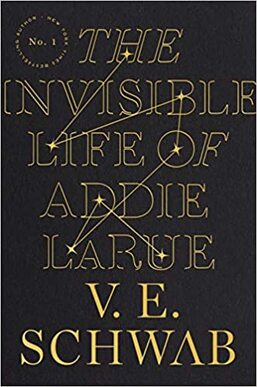Discussion questions:
1. What did you like / dislike? 2. How are art and beauty celebrated in this book? 3. The darkness, when conjured, appears exactly like the dreamlover in Addie's sketches. Is this book trying to suggest we create our own demons? 4. True or false: Most people pass through the world without leaving their mark on history. And: What does a life mean if you can't leave a mark? 5. Which are longer lasting and more likely to leave a legacy -- ideas or memories? 6. What do birds represent in this text? 7. This book immerses you in the story of one young woman. What did you make of the introduction of the Henry character? Jarring? Why after only 300 years does she meet someone like him? 8. I had expected a story about a woman who could not be remembered, a survival story of sorts. Yet, at its core, the situation is a dreamer who doesn't want to conform to the duties of a woman in her society. What expectations did you have as you approached this text? 9. What does true freedom look like? (I think I asked this last summer when we discussed The Water Dancer.) How do conventional norms inhibit or allow for certain freedoms and/or protections? If true freedom is attainable, is it at the expense of protection? What is the right balance? 10. The darkness mocks Addie for only saying what she doesn't want. Do you understand what Addie wants? How can a reader get behind a character who doesn't know what she wants, who doesn't have a goal? At what point did you figure out what Addie wants? Was she passive or active in this process of figuring out what she wanted? 11. When Addie visits her favorite stall at the NYC market, a bakery owned by two women, she says they remind her of Estelle, if she had been born a little kinder, or if she had been born to a different time. In what ways are the characters hemmed in by the time periods they are born into? Do Addie or Henry experience any more or less freedom than they would have in the 1700s? 12. What major world events are mentioned in this book (WWII...and)? Why are these included? What else did you expect to be included and weren't? (Could Addie have been on the Titanic?) Similarly, what liberties were taken with famous people, i.e. why suggest Shakespeare and Beethoven made deals with the devil? 13. What do you make of Addie's observations of Sam, how she acts like reasons come second to needs and sees people as skies? 14. What is the significance of charcoal in this book? It seems to be the most commonly used medium throughout the text. 15. What is a life with no past or future and only presents? 16. Why does she steal The Odyssey of all the texts she could have stolen? 17. What roles does Addie assume through the text that help her or protect her? What do you make of her thought that she feels "safe in the armor of men's fashion" and how jealous she is of how easily men move in the world? 18. What does Addie discover in the world that silences the darkness? (elephants, music, champagne, art) 19. How does this book compare to Circe? 20. Did it bother anyone else how many times the narrator notes that Addie "doesn't care" or Henry "doesn't care" (about whatever circumstances are in front of them)? 21. I thought Addie's devil took the shape of her daydream from youth. So why did the devil have the same appearance when he appeared to Henry? 22. How do Addie's and Henry's deals "nest like Russian dolls"? Why did Addie conclude that they could understand each other clearly? 23. This novel has been described as a "tour de force". What does that mean to you? To me, I think it must describe something wordy that was detailed on a corkboard with index cards that were meticulously shuffled and reorganized many many times. 24. What does the afterlife look like in Luc's world? What is the cost of selling a soul? 25. At the end, Addie seems confident that eventually she will be free. What do you think this looks like for her? Do you believe it will happen? Follow up: Hi there, I know this Zoom thing is getting old, so thanks for coming out to the discussion of Addie Larue last night! Overall, people really liked this one, even though we were a little stumped by some of the terms of her "deal." In the end, we hope she makes it and finds the freedom she seeks. For us, we ended up with a pretty awesome quote from the discussion -- first spoken as an idea by Abby, then shaped into this phrase by Corinne: "Self-expression is the ultimate manifestation of freedom." Love it. For next month, we're going to read Intimacies by Katie Kitamura. We'll meet in the fourth or fifth week of September. Stay tuned for date and location. Hope to see you there! Happy Summer!
0 Comments
Leave a Reply. |
Authors
The Tipsy Mamas' Book Club is co-hosted by Corinne Foster and myself, though the spirit of our discussions is flavored by many readers. Archives
November 2022
|
